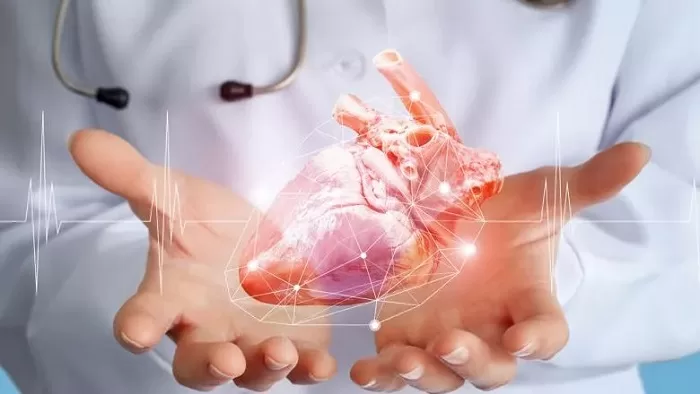Health
AI-Powered Innovations in Cardiovascular Medicine: A New Era of Patient Care

- Artificial intelligence is changing cardiovascular care by allowing for early detection and individualized treatment of high-risk cardiac patients.
- Real-world applications, such as the Optimize AI system, have successfully detected undiagnosed illnesses and improved treatment outcomes.
- Future AI breakthroughs could improve individualized care, remote monitoring, and precision in cardiovascular surgery.
Heart disease is still one of the major causes of death worldwide, putting millions of people at risk each year. Traditionally, identifying persons at high risk for heart disease has depended mainly on subjective assessments and insufficient information. However, the use of artificial intelligence (AI) into cardiovascular care is transforming the profession by providing a more precise and proactive approach to predicting and preventing heart disease.
How Artificial Intelligence Is Transforming Cardiovascular Care
AI’s capacity to scan large datasets and find patterns that are not visible to the naked eye has opened up new possibilities in cardiovascular treatment. Here are some major ways AI is making a difference:
- Predictive Analytics: AI systems can use a patient’s medical history, genetic data, lifestyle decisions, and real-time physiological data to estimate their chance of developing heart disease. This enables early intervention, resulting in tailored treatment strategies that can prevent heart attacks and strokes before they happen.
- Advanced Image Analysis: Deep learning and other AI-powered imaging approaches can detect minor abnormalities in heart scans that human experts may overlook. This allows for more precise diagnoses and timely treatment options, potentially saving lives.
- Wearable Technology: The use of AI into wearable devices such as smartwatches and fitness trackers is revolutionizing heart monitoring. AI can constantly assess data like heart rate, blood pressure, and other vital signs, enabling for the early diagnosis of cardiac problems. This allows patients to take a more active role in maintaining their health.
- Drug Discovery: Artificial intelligence is also accelerating the development of novel medications and cures for cardiac disease. By examining large chemical databases and predicting molecular interactions, AI can uncover promising candidates for novel treatments, potentially leading to more effective pharmaceuticals and better patient outcomes.
Real-World AI Applications in Cardiovascular Care
Several real-world instances demonstrate AI’s transformative potential in detecting and treating cardiac disease:
- Heart Failure Detection: Researchers created AI systems that can accurately diagnose heart failure by examining echocardiograms. This device has the potential to greatly enhance early detection rates, lowering the risk of death from heart failure.
- Risk stratification: Artificial intelligence models can determine a patient’s risk of cardiovascular events by examining genetic information, lifestyle behaviours, and medical history. This allows healthcare providers to personalise treatment programs to each patient’s specific needs, resulting in better outcomes and fewer adverse events.
- Wearable Heart Monitoring: AI-powered smartwatches may detect irregular heart rhythms like atrial fibrillation, which is a significant risk factor for stroke. Early detection and treatment can dramatically minimise the risk of complications, thereby improving patient outcomes.
Optimise AI System: A Successful Case Study
A pioneering AI system called Optimise, created with the assistance of the University of Leeds, demonstrates the practical application of AI in cardiovascular care. Optimise evaluated almost two million people’s health records, indicating over 400,000 people who are at high risk for illnesses such as heart failure, stroke, or diabetes. These high-risk patients accounted for 74% of all heart-related deaths, emphasising the significance of early detection and treatment.
In a pilot analysis of 82 high-risk patients, Optimise discovered undiscovered chronic renal disease in one in every five and prescribed different drugs to more than half of those with high blood pressure. This strategy may enable healthcare practitioners to treat patients early, thereby reducing pressure on overworked healthcare systems like the NHS.
The Future of AI in Cardiovascular Care
As AI technology advances, its significance in cardiovascular care is expected to become even more. Future breakthroughs could include:
- Personalised Treatment Plans: AI-powered systems can tailor treatment plans to each patient’s specific traits and risk factors.
- Remote Monitoring: Artificial intelligence could provide continuous remote monitoring of patients with cardiac disease, enabling early detection of problems and increasing patients’ quality of life.
- AI-Assisted Surgery: In the future, AI-powered robotic equipment could help surgeons conduct intricate heart surgeries more precisely and accurately.
Conclusion
AI is poised to transform cardiovascular care by allowing doctors to identify high-risk patients early, enhance diagnostic accuracy, and provide individualised treatment regimens. As AI technology advances, the opportunity to reduce heart disease-related fatalities and improve patient outcomes will only increase. By adopting these technologies, we can look forward to a future in which heart disease is less of a threat.

























































